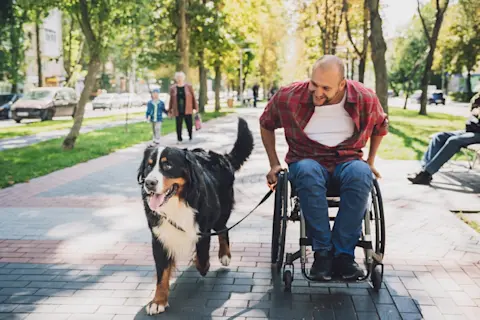Dogs are often trained to help individuals with disabilities. Medical alert dogs keep people safe and companion dogs or therapy dogs bond with humans to provide emotional support. But what is it that dogs really understand? Do they sense when someone has a disability and act accordingly? Or are they simply taught to be patient with someone who needs more care or attention?
There is no definitive answer to confirm that dogs can truly distinguish when someone has a disability, but understanding how dogs relate to us, and how they respond to differences in individuals, can explain quite a bit.
Dogs are social. They use physical cues and a range of behaviors to communicate with other dogs and research suggests they use these same skills to read their human companions, says Susan Nilson, a canine behavior professional and founder of The Cat And Dog House.
“When humans are stressed, anxious, ...












